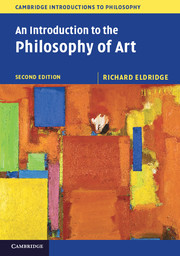Book contents
- Frontmatter
- Contents
- Acknowledgments
- Preface to the second edition
- 1 The situation and tasks of the philosophy of art
- 2 Representation, imitation, and resemblance
- 3 Beauty and form
- 4 Expression
- 5 Originality and imagination
- 6 Understanding art
- 7 Identifying and evaluating art
- 8 Art and emotion
- 9 Art and morality
- 10 Art and society: some contemporary practices of art
- 11 Epilogue: the evidence of things not seen
- Bibliography
- Index
- References
7 - Identifying and evaluating art
Published online by Cambridge University Press: 05 June 2014
- Frontmatter
- Contents
- Acknowledgments
- Preface to the second edition
- 1 The situation and tasks of the philosophy of art
- 2 Representation, imitation, and resemblance
- 3 Beauty and form
- 4 Expression
- 5 Originality and imagination
- 6 Understanding art
- 7 Identifying and evaluating art
- 8 Art and emotion
- 9 Art and morality
- 10 Art and society: some contemporary practices of art
- 11 Epilogue: the evidence of things not seen
- Bibliography
- Index
- References
Summary
Why we go on arguing about which works are good
The identification and evaluation of objects or performances as works of art is often a process fraught with passion and difficulty. We care about some favorite works that we regard as successful – certain books or movies or paintings – in the way we care about our friends. They appeal to us both immediately and deeply. We often remember them, revisit them, reread them, or rehear them. We recommend them to others, and we are then pleased if the work engages them and sometimes disappointed or troubled if it does not. Prices in the art market and publishing industry depend on what people respond to, as does support by governments and foundations for work in progress.
We often have trouble, however, saying why we respond to a work in the way we do, especially when we are faced with original work. We worry about being taken in, and we can be hesitant to display our enthusiasms. Yet most of us cannot help giving ourselves over to some objects or performances, even to some new and difficult work. Just how and why are we moved to do this? Are there any procedures for being right (at least more often) about which works genuinely have artistic value? What are the relative roles of feeling (liking) and reason in our responses to art? Does reason even play a role? Are or can there be experts in the identification and evaluation of works of artistic value, authorities whose verdicts deserve our deference?
- Type
- Chapter
- Information
- An Introduction to the Philosophy of Art , pp. 167 - 199Publisher: Cambridge University PressPrint publication year: 2014

